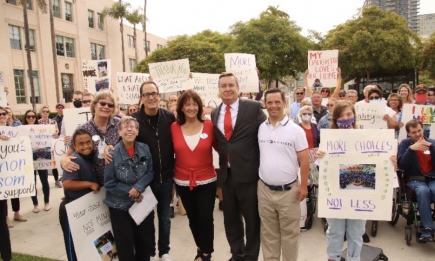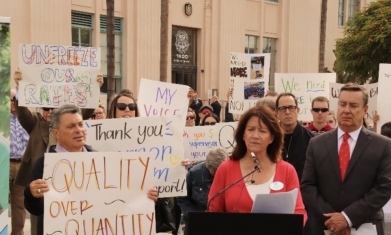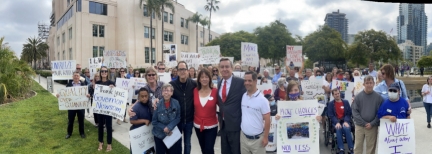 By Henri Migala
By Henri Migala
June 19, 2022 (Spring Valley) – A change in the state’s funding formula threatens to force Noah Homes in Spring Valley to evict 40 percent of the residents it houses, all with intellectual and development disabilities (I/DD). Now San Diego County Supervisor Joel Anderson and Chairman Nathan Fletcher are joining forces to urge the state to change its policy.
Both Supervisors held a press conference with Noah Homes on June 14 before presenting a motion to the Board of Supervisors to request modification to the State’s reimbursement rates for all housing and services provides for adults with intellectual and developmental disabilities (I/DD).
Approximately 100 people attended the press conference, held in the Civic Green at Waterfront Park to show unity with Noah Homes and call on Supervisors, the state’s Department of Developmental Services (DDS), the California Budget Committee and the Governor to support housing and services for adults with intellectual and developmental disabilities.
DDS submitted a rate study addressing the sustainability, quality, and transparency of community-based services for individuals with developmental disabilities to the Legislature in March 2019. As a result of this study, new reimbursement rates were established. However, the rate study did not include rate models for homes with seven or more residents. So care models based on group homes, such as Noah Homes, will continue to be reimbursed at existing rates. That has made it challenging for Noah Homes and other larger facilities to serve the I/DD population, since the rate study recommends rate increases only for community care facilities with six or fewer placements.
 “Housing and support services for adults with intellectual and developmental disabilities are critically underfunded in California. At the same time, as of April 1, DDS implemented a new freeze in reimbursement rates for Noah Homes and ALL other Community Care Facilities with seven or more beds across the state, despite record inflation,” a press release from Noah Homes states. “Noah Homes is one of the largest housing providers in San Diego for adults with developmental disabilities. This funding freeze directly impacts the housing availability and quality of housing choices for adults with developmental disabilities such as autism and Down syndrome across California. All other housing providers with six or fewer beds are getting an increase in their reimbursement rate.”
“Housing and support services for adults with intellectual and developmental disabilities are critically underfunded in California. At the same time, as of April 1, DDS implemented a new freeze in reimbursement rates for Noah Homes and ALL other Community Care Facilities with seven or more beds across the state, despite record inflation,” a press release from Noah Homes states. “Noah Homes is one of the largest housing providers in San Diego for adults with developmental disabilities. This funding freeze directly impacts the housing availability and quality of housing choices for adults with developmental disabilities such as autism and Down syndrome across California. All other housing providers with six or fewer beds are getting an increase in their reimbursement rate.”
The Noah Homes release continued, "This is not based on quality or interest in our housing, this is purely based on the number of `beds’ we provide. Although this went into effect on April 1, there is still time to appeal to our elected officials and we need the community’s help now in getting the word out about this error.”
 At the highest service level, the new reimbursement structure pays facilities with four or less individuals with I/DD per homeat $10,795 per individual, and a lower rate of $8,476 per individual for facilities with seven or more individuals. As the cost of living has risen significantly in recent years, facilities like Noah Homes, which house eight to eleven individuals with I/DD per 5,000 sq. foot unit, will be unable to sustain their existing Home and Community-Based Service model under thenew rates. As a result, Noah Homes, and similar facilitiesmay have to evict existing residents to meet the new state rate of reimbursement per individual, despite the quality of care of the facility.
At the highest service level, the new reimbursement structure pays facilities with four or less individuals with I/DD per homeat $10,795 per individual, and a lower rate of $8,476 per individual for facilities with seven or more individuals. As the cost of living has risen significantly in recent years, facilities like Noah Homes, which house eight to eleven individuals with I/DD per 5,000 sq. foot unit, will be unable to sustain their existing Home and Community-Based Service model under thenew rates. As a result, Noah Homes, and similar facilitiesmay have to evict existing residents to meet the new state rate of reimbursement per individual, despite the quality of care of the facility.
 The negative fiscal impact of the new state rates on Noah Homes will be $1 million this fiscal year alone. Noah Homes held a fund raiser recently and, thanks to donors and community supporters, Noah Homes was able to raise enough funding to cover the shortfall for this year.
The negative fiscal impact of the new state rates on Noah Homes will be $1 million this fiscal year alone. Noah Homes held a fund raiser recently and, thanks to donors and community supporters, Noah Homes was able to raise enough funding to cover the shortfall for this year.
In addition to providing housing to San Diego County residents with I/DD, Noah Homes also has the only memory care home in California specifically serving adults with I/DD who are suffering from Alzheimer’s and other forms of dementia. The facility is a globally recognized model that has served our community for over 39 years.
Their model, which provides opportunities for their residents to live in group settings, provides lifelong housing in 10 homes for 90 adults with I/DD ranging from 23 to 72 years old. The State has significantly limited reimbursement increases for facilities in their service category.
Statistics show that many people with I/DD are frequently outliving their parents for the first time in history, further demonstrating the need for more and expanded care facilities for adults.
“Noah Homes is a residential care facility in Spring Valley that offers a caring, community-based housing model for adults with intellectual and developmental disabilities that allows them to live in a community of folks with similar disabilities,” said Jenn Moss, HR Manager for Noah Homes. “They live with us full time and the services we provide are very important to dementia care. What ourresidents really enjoy and appreciate is that they live together, in large homes,” Moss added. “Everyone has a single or double room, but they live in a larger home together, so they can live together, and eat together, and share life together, and that’s what our residents really enjoy, appreciate and embrace.”
Noah Homes has 10 houses with 6 to 11 residents each. Under the new reimbursement rates established by the State, Noah Homes would need to evict 40 percent of its residents to be eligible to receive higher reimbursement rates based on the current DDS Regional Center Care Facility Payment Rates Per Consumer structure.
 Supervisors take action
Supervisors take action
The motion, unanimously approved by the Board of Supervisors, directs the Chief Administrative Officer to include in the Board’s legislative program support for State legislation and/or administrative actions that would adjust reimbursement rates in order to sustain operations and/or funding for Regional Centers and Community Care Facilities (CCFs) that serve persons with I/DD.
The action also directs the Chief Administrative Officer to write a letter to the Director of DDS and Secretary of California Health and Human Services (CalHHS), with a resolution, requesting increased funding for Regional Centers and all models of CCFs that serve persons with I/DD.
According to the Supervisors Fletcher and Anderson, approval of this item will not result in any additional General Fund costs or any additional staff years.
“I am proud to partner with Chair Fletcher on a board letter that would call upon the State to continue to meet the needs of San Diego County residents with intellectual and developmental disabilities,” wrote Supervisor Anderson. “I am lucky to have an organization like Noah Homes, who is one of San Diego’s largest providers of housing to County residents with I/DD, in my district and am thankful for their support of this initiative.”
Molly Nocon, CEO of Noah Homes, stated, “Noah Homes has more than 200 people on a list who want to live here. But we don’t have room. I have so many people calling me saying they can’t find a home for their adult son or daughter and are worried what is going to happen to them when they’re no longer alive. The residents that live here are happy, their families are happy, life is good.”
![]()
 Nocon continued, “I don’t understand why smaller homes are getting reimbursement rate increases but we are not, when all we are doing is helping more people find more homes. We are a “best practice model”that others across the country are looking to and asking for our help in finding their own innovating housing solutions. We are so grateful to have such amazing leadership in San Diego, including Supervisor Anderson and Supervisor Fletcher, who are working with us to right this wrong. We look forward to continuing to work with our state legislators and DDS to ensure they are providing the funding we need to ensure our residents have quality housing options today and even more in the future, not less.”
Nocon continued, “I don’t understand why smaller homes are getting reimbursement rate increases but we are not, when all we are doing is helping more people find more homes. We are a “best practice model”that others across the country are looking to and asking for our help in finding their own innovating housing solutions. We are so grateful to have such amazing leadership in San Diego, including Supervisor Anderson and Supervisor Fletcher, who are working with us to right this wrong. We look forward to continuing to work with our state legislators and DDS to ensure they are providing the funding we need to ensure our residents have quality housing options today and even more in the future, not less.”
Tim Riemann, resident of Noah Homes, and member of the Board of Directors of the San Diego Resource Center. Riemann is an advocate who speaks for members of the I/DD community who live in different housing choices, and advocates on the issues of clients’ rights.
“I live at Noah Homes and my house has 10 people in it,” said Riemann. “They are like family to me.”
“I’m proud to live at Noah Homes, and I’m proud of myself, because I made a choice to live here,” stated Riemann, “and so did all my friends. I deserve to make my own choices, just like all of you.”
If the state does not alter the reimbursement rates, Riemann, and his housemates, face eviction because the funding would not be there to support the little community he and his friends have made for themselves.
Riemann’s comments made clear one of the vitally important issues in the care of I/DD care residents. Because of their unique needs, they experience unique challenges, and they find a place, belonging, community and family in their communal settings that would be difficult, if not impossible, to find anywhere else.
Moss concluded, “We believe that all adults, regardless of their situation, should be able to choose where they want to live and nobody should be able to tell them that they can’t.”









Recent comments